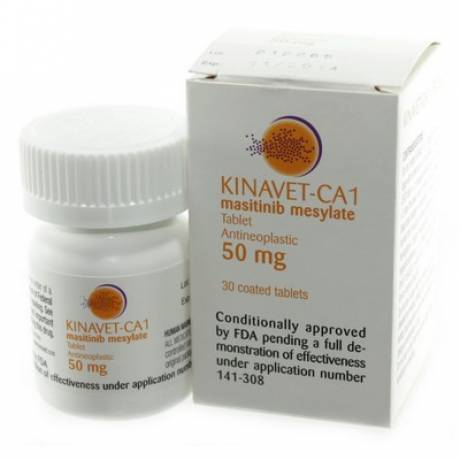
Kinavet-CA1 (masitinib mesylate) Rx
Kinavet-CA1
Kinavet-CA1 is an innovative anticancer drug for dogs used to shrink some cancerous tumors that cannot be successfully treated with surgical measures. This approved medication is the first of its kind in veterinary science.
- Prescribed for treating recurrent or non-resectable mast cell cancer tumors in dogs
- Also prescribed to treat thyroid carcinoma, osteosarcoma, soft tissue sarcoma, and melanoma in dogs
- Prevents tumor growth and the spread of tumors
- Small coated tablets for easy, daily oral dosing
If your dog has a non-resectable or recurrent Grade II or III cutaneous mast cell tumor, and hasn’t had radiotherapy or chemotherapy, your veterinarian may prescribe Kinavet-CA1 to help treat the cancer. Kinavet-CA1 is type of medication called a tyrosine kinase inhibitor that targets the pathways that regulate important cell functions. This medication (also known as masitinib mesylate), works in three different ways to treat your pet’s cancer. First, Kinavet-CA1 works at the site of the tumor to stop the survival signal sent by the tumor cells, a process that can make the tumor disappear. This medication also helps prevent additional tumor growth and stops metastasis, or the spread of tumor cells. Veterinarians may also prescribe this medication for other conditions in dogs and cats. Kinvaet-CA1 is approved for veterinary use, is safe, and is generally well tolerated with manageable side effects.
What you should know about Kinavet-CA1:
- Talk to your veterinarian before using this product.
- Follow dosing directions exactly - don’t give your pet more medication than directed and don’t skip doses.
- Read the label carefully for information about storage, possible side effects, and drug interactions.
For additional information about Kinavet-CA1, click the “More Information” and “Package Insert” tabs above.
No Reviews Yet
Q & A
-
My cat has Fibrosarcoma. in her right hind quarters. She has had two surgeries so far and no chemo or radiation. My vet has recommended this drug. I trust him, but I need to know is it safe for cats?
-
Because of the severity of your cat's condition, your veterinarian has likely found that the advantages of using this medication outweigh the potential adverse effects. Common side effects from this medication include decreased appetite, vomiting, and diarrhea. Less common side effects include tiredness, cough, and loss of hair. Your vet may schedule a follow-up appointment with lab work to see how your cat is tolerating Kinavet CA-1. If your cat isn't tolerating the medication well, your veterinarian may choose to decrease the dose of the medication. Thank you, VetRxDirect
Verified Answer
-
-
does the drug Carprofen interact fine with Kinavet??
-
The Kinavet manufacturer said there are no known drug interactions with carprofen. Tell your veterinarian before adding any medications (including over the counter) to your pet’s drug therapy. Thank you, VetRxDirect
Community Answer
-
-
My dog is on Masitinib, 100 mg daily for treatment of lung nodules.After 2 wks of being on Masitinib, considerable reduction of lung nodules. on it for another 4 wks. Can the supplements-concentrated wei qi booster and Immuplex be used with Masitinib ? ?
-
Wei Qi Booster and Immuplex are both herbal supplements that are lacking clinical evidence regarding supplement-to-drug interactions. We suggest you contact your pet's veterinarian who will be able to provide you the best advice for your dog's condition and medication therapy. Thank you, VetRxDirect
Community Answer
-
-
Is Kinavet (Mastinib) a type of chemotherapy??
-
Kinavet, generic name mastinib, is a tyrosine-kinase inhibitor used to treat certain types of cancerous tumors. Kinavet is a chemotherapy agent that is indicated for the treatment of recurrent or non-resectable mast cell tumors. Thank you, VetRxDirect
Community Answer
-
-
how long the drug be used on Mast cell tumor grade III??
-
Maximous, The length of treatment will be dependent on the mast cell tumor’s response to Kinavet-CA1. Your veterinarian will be able to evaluate the tumor response to determine if the treatment is continued. The usual minimum duration of treatment is around 6 months depending on tumor response. Thank you, VetRxDirect
Community Answer
-

